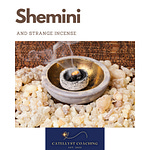I typed the show notes while listening to:
I am back from break and I am glad to be back! Breaks are so good for the soul. But, so is living out your purpose.
In this episode, I share a story, a flashpoint of personal inspiration from a couple of weeks ago.
I also talk about my favorite show on MTV back in the day…
…aaaaaannnnnnnddddd about my total lack of comprehension of time. (shocked, right?)
Parsha Summary
I also share that I won’t be reviewing the Aliyah Summary during the audio podcast anymore. Time is short, and hundreds, maybe even hundreds of thousands of websites and resources can tell you a summary of the Torah Portion each week. And since this week is about priorities, I have decided to just type the Aliyah summary in the show notes. I do hope you will take the time to read the weekly portion for yourself, and I would love to have a dialogue with you in the chat about what you notice, what you wonder about, and your big ideas from this week’s parsha.
This week's Torah reading, Vayikra, begins the third book of the Torah, Leviticus. Last week we completed the book of Exodus, YAYYY, B”H!
G‑d calls out to Moses from the Tabernacle and teaches him about the Olah, or whole burnt offering. I think of it as a gratitude sacrifice.
G-d teaches Moses the laws of the birds for Olah, and then unbaked flour, baked loaves, and the shallow-fried meal offering. All voluntary meal offerings also contained olive oil and frankincense (one of my favorite oils).
The Torah describes the last type of voluntary meal offerings: a fried matzo type offering, and the mandatory barley offering, the Omer offering, brought on the second day of Passover. Then G-d commands them to salt everything (my husband’s favorite commandment)!
The "Peace Offering," the Shelamim sacrifice, is described in this Aliyah. The Shelamim was shared by the altar, which consumed some of the animal's fat. Then the Kohanim, and the donors of the sacrifice were given the bulk of the meat to eat.
We now begin learning about the "Sin Offering," the Chatat sacrifice, brought by an individual who is guilty of inadvertently transgressing a sin. It is important to note that this offering is for sins we didn’t intend. This category is for leaders, as well. Can you find a sacrifice for intentional sin in the Torah?
The Torah discusses the fourth and final type of Chatat is when an ordinary person sins. Also discussed is the Korban Oleh Viyored, a "vacillating" Sin Offering, brought by an individual guilty of certain specific sins. The Korban Oleh Viyored depended on the financial position of the transgressor. The wealthier a person, the more expensive the offering (within limits, of course). What do you think about offerings based on financial ability? Why do you think this is?
This section concludes the laws of the Korban Oleh Viyored, the "Guilt Offering," the Asham Sacrifice. These sacrifices are meant to appease the guilt and bring closure for minor issues, like when someone doesn’t know if they sinned. Did I ever tell you how much I love how the Torah always embraces the psychology of the human experience?
How about you?
I was talking in the episode about learning to “number our days” as the Psalmist says. I would love to hear from you in the comments: What stuck out to you in this episode? What would you like to share?












Share this post